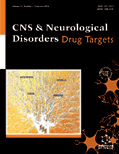To find the most relevant journal, please insert appropriate keyword to facilitate search.
Search Results: CNSNDDT

CNS & Neurological Disorders - Drug Targets
ISSN: 1871-5273 (Print)
eISSN: 1996-3181 (Online)
Special Issues With Active Call for Papers
Heart and Brain Axis Targets in CNS Neurological Disorders
Recently there has been a surge of interest in delving deeper into the complex interplay between the heart and brain. This fascination stems from a growing recognition of the profound influence each organ holds over the other, particularly in the realm of central nervous system (CNS) neurological disorders. The purpose of this special issue is to meticulously explore and elucidate the identification and characterization of therapeutic targets that have the capacity to influence both cardiac... see more
Lifestyle Interventions to Prevent and Treat Cognitive Impairment and Dementia
More than 55 million people live with dementia worldwide. By 2050, the population affected by dementia will exceed 139 million individuals. Mild cognitive impairment (MCI) is a pre-dementia stage, also known as prodromal dementia, affecting older adults. MCI emerges years before the manifestation of dementia but can be avoidable and reversible. Although individuals carrying the APOE E4 gene have a higher risk of Alzheimer’s Dementia, lifestyle is the major risk factor for the development of... see more
Pathogenic Proteins in Neurodegenerative Diseases: From Mechanisms to Treatment Modalities
The primary objective of this thematic issue is to elucidate the molecular mechanisms by which pathogenic proteins contribute to neurodegenerative diseases and to highlight current and emerging therapeutic strategies aimed at mitigating their effects. By bringing together cutting-edge research and reviews, this issue aims to: 1.Enhance Understanding: Provide a comprehensive overview of the molecular pathways involved in the pathogenesis of neurodegenerative diseases. 2.Highlight Innovations: Showcase recent advancements in therapeutic interventions targeting pathogenic proteins. 3.Foster Collaboration:... see more
Role of glial cells in autism spectrum disorder: Molecular mechanism and therapeutic approaches
Emerging evidence suggests that glial cells may play a pivotal role in neuroanatomical and behavioral changes found in autism spectrum disorder (ASD). Many individuals with ASD experience a neuro-immune system abnormalities throughout life, which implicates a potential role of microglia in the pathogenesis of ASD. Dysfunctional astrocytes and oligodendrocytes were shown to contribute to neurochemical imbalances and modifying axonal conduction in ASD. Altogether it is suggested that alterations in axons, myelin and exacerbated inflammation play... see more